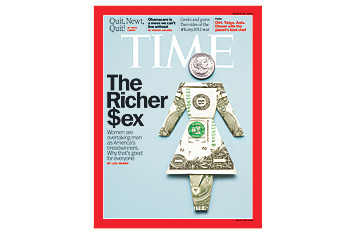
(3 of 7)
Money isn't everything, but when it comes to how society is organized, it's a lot. Until the mid--19th century, women's property--their very identity--was subsumed into that of their husband, a tradition so important that in 1868, when England was considering giving property rights to married women, the London Times warned that such a move would destroy marriage as society knew it, which consisted of "authority on the one side and subordination on the other." Were a wife to become financially empowered, the paper editorialized, she would be "practically emancipated" from control by her husband. "What is to prevent her from going where she likes and doing what she pleases?"
Well, plenty, actually. Even after property laws changed, women's dependence was ensured for another century by factors including gender segregation in the workplace, a lower wage scale for women, restraints on the employment of married women and obstacles to advancement in jobs--all seen as necessary to ensure men's breadwinning ability and guarantee that women would remain loyal helpmeets. Feminists like Simone de Beauvoir saw economic independence as central to women's liberation and even humanity, arguing that for centuries--millennia, even--men had used economic power to purchase women's domestic services and ensure their sexual fidelity. De Beauvoir called this "the deal" and argued that women were poorer in every sense for accepting it. Evolutionary psychologists, meanwhile, argued that dependence was women's desired condition--that women were genetically driven to seek providers who could support their offspring. You could call it a contest between Marx and Darwin: the Marxist camp saw the economic superiority of men as oppressive and wrong, while the Darwinists saw it as natural and beneficial to women.
Either way, the deal is off. The high-paying industrial jobs that once enabled a man with a high school education to bring home a family wage are disappearing. And as women become co-breadwinners or primary breadwinners in more households, all kinds of assumptions about how the household works are changing.
Start with the domestic division of labor. Until recently, it was a fond belief among sociologists that wives who earned more than their husbands did more housework, to reassert their femininity, and men did less, to re-establish control and preserve their masculine image. But a 2011 study by Oxford University sociologist Oriel Sullivan showed that data had been misinterpreted, in part because the idea of men's resisting change was just presumed. In truth, women's housework hours have dropped as men's have risen. According to a study by Ohio State University sociologist Liana Sayer, women's housework decreased by 70 minutes a day from the 1970s to the beginning of the 21st century in the U.S., while men's increased by about a half hour since 1965. Even husbands of stay-at-home wives do more housework than they used to.
